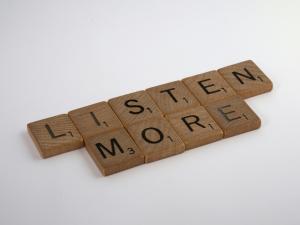
James 1 calls us to be “quick to listen, slow to speak, slow to grow angry.” So why should we do that? More importantly, HOW do we do that?
Scripture:
Isaiah, chapters 29-31; James, chapter 1
James 1:19-27 (CEB):
Know this, my dear brothers and sisters: everyone should be quick to listen, slow to speak, and slow to grow angry. This is because an angry person doesn’t produce God’s righteousness. Therefore, with humility, set aside all moral filth and the growth of wickedness, and welcome the word planted deep inside you – the very word that is able to save you.
You must be doers of the word and not only hearers who mislead themselves. Those who hear but don’t do the word are like those who look at their faces in a mirror. They look at themselves, walk away, and immediately forget what they were like. But there are those who study the perfect law, the law of freedom, and continue to do it. They don’t listen and then forget, but they put it into practice in their lives. They will be blessed in whatever they do.
If those who claim devotion to God don’t control what they say, they mislead themselves. Their devotion is worthless. True devotion, the kind that is pure and faultless before God the Father, is this: to care for orphans and widows in their difficulties and to keep the world from contaminating us.
Observations: Quick to Listen
James begins this passage with three challenges for believers: everyone should be quick to listen, slow to speak, and slow to grow angry. I want us to consider the meaning of each of these phrases before we try to put them all together. Who should we listen to? Well, of course, first we should listen to God. Earlier in chapter 1 James encourages those who need wisdom to ask God (James 1:5). If we ask God something, shouldn’t we listen to what He is saying?
That call to listen to God goes beyond those situations when we ask Him something. Listening to God is a foundational practice for His people. In our passage from Isaiah today, God tells us this: “People in Zion, who live in Jerusalem, you will weep no longer. God will certainly be merciful to you. Hearing the sound of your outcry, God will answer you. Though the Lord gives you the bread of distress and the water of oppression, your teaching will no longer hide, but you will see your teacher. If you stray to the right or the left, you will hear a word that comes from behind you: ‘This is the way; walk in it’” (Isaiah 30:19-21, emphasis added).
So we need to be quick to listen to God – but sometimes God speaks to us through other people. God spoke to His people through James, and Isaiah, and numerous other prophets and leaders. He continues to speak to us through those He chooses today. As I pointed out yesterday (“Earthly Rulers and Spiritual Leaders”), spiritual leaders are those “who spoke God’s word to you” (Hebrews 13:7). Bottom line, we should be quick to listen – and trust God to help us sort it out.
Slow to Speak
If we’re going to be quick to listen, we also need to be slow to speak. After all, it’s hard to listen while you’re talking! Unfortunately, most people abhor silence as much as nature abhors a vacuum. Instead of listening to those who are speaking to us, we’re planning our response. And I’m afraid that too many times we’re too busy planning what we’re going to say to God to listen to what He wants to say to us! But if we’re slow to speak, we give God time to speak to us.
Slow to Grow Angry
James’ third admonition is that we should be slow to get angry. Notice who he directs this to: everyone. The challenge is that so much of the noise that we hear in our culture today tries to make us angry – or afraid. The result is the same: anger and fear both drive us to react, rather than reason. Over the past several years, I’ve heard and read numerous variations on this thought: “If you’re not angry, you’re not paying attention.”
The problem is that what makes one person angry makes another person glad. Why is that? James tells us: An angry person doesn’t produce God’s righteousness. No matter how much we try to justify human anger, it does not make us more like Jesus.
Slow to grow angry doesn’t mean that we never get angry. After all, Jesus got angry. But Jesus’ anger wasn’t an emotional reaction; it was a reasoned response. If we are quick-tempered, we act humanly; if we are slow to get angry, we allow God to work in us and through us. At the appropriate time, we respond in God’s way.
Application: Quick to Listen, Slow to Speak, Slow to Get Angry
So what are we to do? What steps can we take to practice quick to listen, slow to speak, slow to get angry? James gives us these action steps:
- With humility set aside all moral filth and the growth of wickedness, and welcome the word planted deep inside you (verse 21)
- Be doers of the word and not only hearers who mislead themselves (verse 22)
- Study the perfect law, the law of freedom, and continue to do it (verse 25)
- Control what we say (verse 26)
I think that last item is critically important. If those who claim devotion to God don’t control what they say, they mislead themselves. Their devotion is worthless. Worthless! Isn’t that rather harsh? Well, here’s what Jesus says: “Why do you call me ‘Lord, Lord,’ and don’t do what I say?” (Luke 6:46). Quick to listen, slow to speak, slow to get angry is a succinct explanation of much of Jesus’ teaching.
Quick to listen, slow to speak is an important first step toward humility. “You know that the rulers of the Gentiles show off their authority over them and their high-ranking officials order them around. But that’s not the way it will be with you. Whoever wants to be great among you will be your servant” (Matthew 20:25-26). As God develops humility in us, we will become slow to anger, because much of our anger results from our pride. “Adopt the attitude that was in Christ Jesus” (Philippians 2:5).
Prayer:
Father, so much of our cultural discourse is driven by anger. That anger, in turn, promotes and provokes fear. Thank you for calling us to a better way. When we are quick to listen, we better understand our brothers and sisters. Being slow to speak gives you the opportunity to speak to us. And being slow to anger takes our pride and insecurity out of the equation, so we can respond to you rather than reacting to the world around us.
You know us well enough to understand what a challenge this is for us! Help us today to step back and listen to you before anger and pride can “push our buttons.” Help us to be quick to listen, slow to speak, and slow to grow angry, that you may be glorified in us. Amen.

















